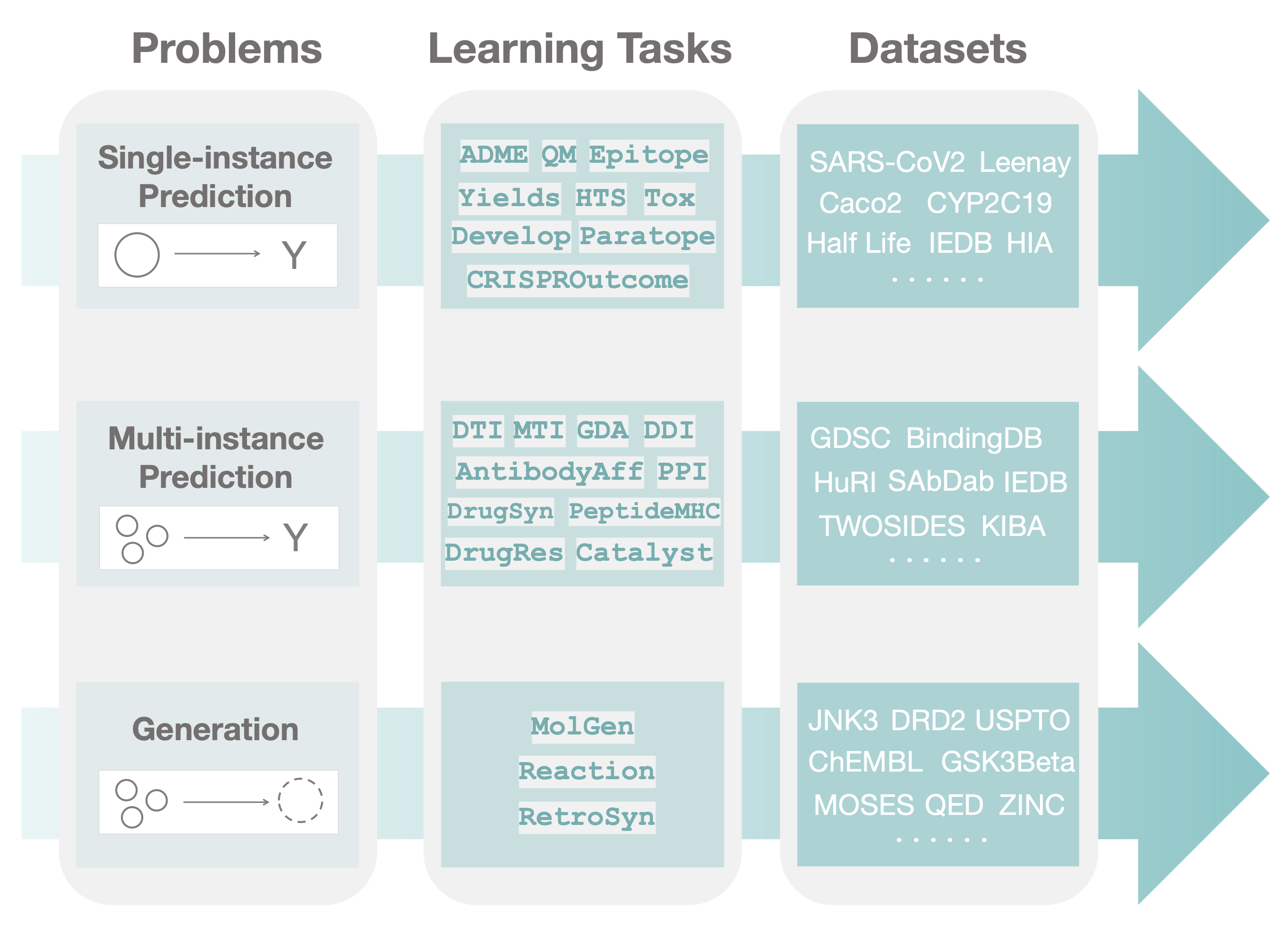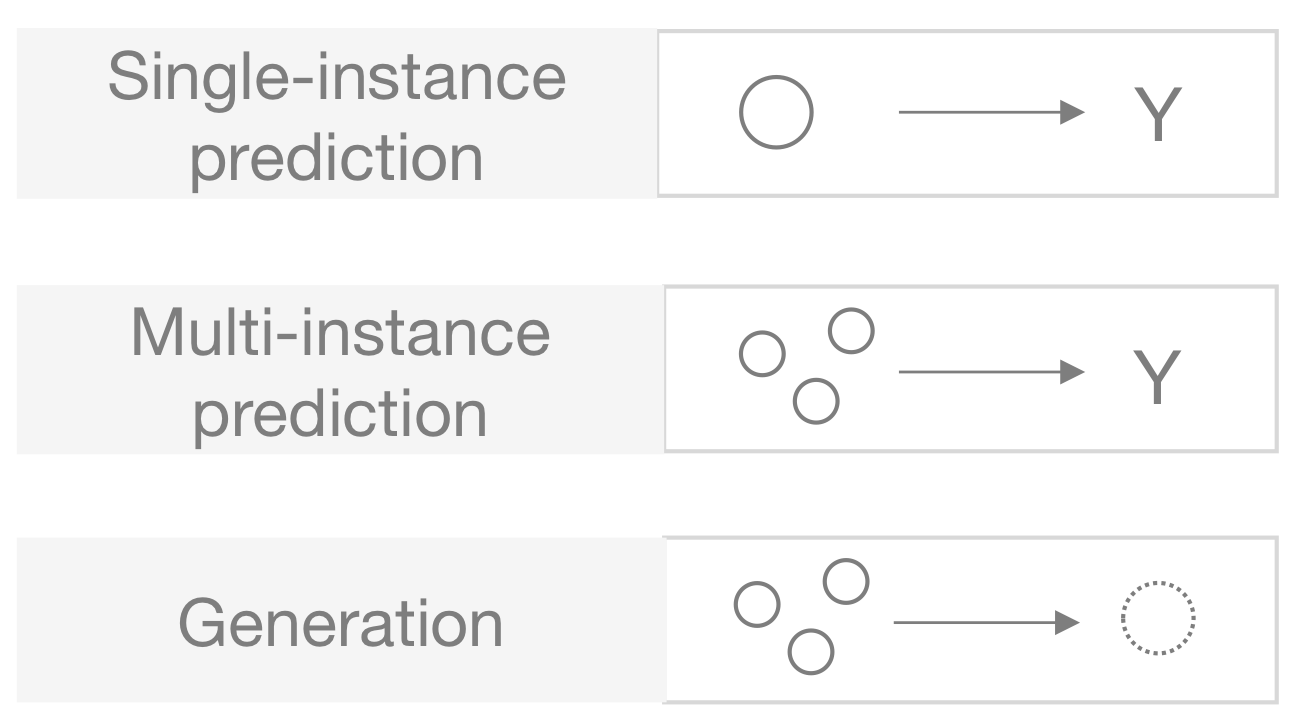mims-harvard / Tdc
Projects that are alternatives of or similar to Tdc
Project Website | Paper | TDC Mailing List |
Therapeutics Data Commons (TDC) is the first unifying framework to systematically access and evaluate machine learning across the entire range of therapeutics.
The collection of curated datasets, learning tasks, and benchmarks in TDC serves as a meeting point for domain and machine learning scientists. We envision that TDC can considerably accelerate machine-learning model development, validation and transition into biomedical and clinical implementation.
TDC is an open-source initiative. To get involved, join the Slack Workspace and check out the Contribution Guide!
Invited talk at the Harvard Symposium on Drugs for Future Pandemics (#futuretx20) [Slides] [Video]
Updates
-
0.1.8: Streamlined and simplified the leaderboard programming frameworks! Now, you can submit a result for a single dataset! Checkout here! - TDC white paper is alive on arXiv!
-
0.1.6: Released the second leaderboard on drug combination screening prediction! Checkout here! -
0.1.5: Added four realistic oracles from docking scores and synthetic accessibility! Checkout here! -
0.1.4: Added the 1st version ofMolConvertclass that can map among ~15 molecular formats in 2 lines of code (For 2D: from SMILES/SEFLIES and convert to SELFIES/SMILES, Graph2D, PyG, DGL, ECFP2-6, MACCS, Daylight, RDKit2D, Morgan, PubChem; For 3D: from XYZ, SDF files to Graph3D, Columb Matrix); Also a quality check on DTI datasets with IDs added. - Checkout Contribution Guide to add new dataset, task, function!
-
0.1.3: Added new therapeutics task on CRISPR Repair Outcome Prediction! Added a data function to map molecule to popular cheminformatics fingerprint. -
0.1.2: The first TDC Leaderboard is released! Checkout the leaderboard guide here and the ADMET Leaderboard here. -
0.1.1: Replaced VD, Half Life and Clearance datasets from new sources that have higher qualities. Added LD50 to Tox. -
0.1.0: Molecule quality check for ADME, Toxicity and HTS (canonicalized, and remove error mols). -
0.0.9: Added DrugComb NCI-60, CYP2C9/2D6/3A4 substrates, Carcinogens toxicity! -
0.0.8: Added hREG, DILI, Skin Reaction, Ames Mutagenicity, PPBR from AstraZeneca; added meta oracles!
Features
- Diverse areas of therapeutics development: TDC covers a wide range of learning tasks, including target discovery, activity screening, efficacy, safety, and manufacturing across biomedical products, including small molecules, antibodies, and vaccines.
- Ready-to-use datasets: TDC is minimally dependent on external packages. Any TDC dataset can be retrieved using only 3 lines of code.
- Data functions: TDC provides extensive data functions, including data evaluators, meaningful data splits, data processors, and molecule generation oracles.
- Leaderboards: TDC provides benchmarks for fair model comparison and a systematic model development and evaluation.
- Open-source initiative: TDC is an open-source initiative. If you want to get involved, let us know.
Installation
Using pip
To install the core environment dependencies of TDC, use pip:
pip install PyTDC
Note: TDC is in the beta release. Please update your local copy regularly by
pip install PyTDC --upgrade
The core data loaders are lightweight with minimum dependency on external packages:
numpy, pandas, tqdm, scikit-learn, fuzzywuzzy, seaborn
For utilities requiring extra dependencies, TDC prints installation instructions. To install full dependencies, please use the following conda-forge solution.
Using conda
Data functions for molecule oracles, scaffold split, etc., require certain packages like RDKit. To install those packages, use the following conda installation:
conda install -c conda-forge pytdc
Cite Us
If you found our work useful, please cite us:
@article{tdc,
title={Therapeutics Data Commons: Machine Learning Datasets and Tasks for Therapeutics},
author={Huang, Kexin and Fu, Tianfan and Gao, Wenhao and Zhao, Yue and Roohani, Yusuf and Leskovec, Jure and Coley, Connor W and Xiao, Cao and Sun, Jimeng and Zitnik, Marinka},
journal={arXiv preprint arXiv:2102.09548},
year={2021}
}
Design of TDC
TDC has a unique three-tiered hierarchical structure, which to our knowledge, is the first attempt at systematically organizing machine learning for therapeutics. We organize TDC into three distinct problems. For each problem, we give a collection learning tasks. Finally, for each task, we provide a series of datasets.
In the first tier, after observing a large set of therapeutics tasks, we categorize and abstract out three major areas (i.e., problems) where machine learning can facilitate scientific advances, namely, single-instance prediction, multi-instance prediction, and generation:
- Single-instance prediction
single_pred: Prediction of property given individual biomedical entity. - Multi-instance prediction
multi_pred: Prediction of property given multiple biomedical entities. - Generation
generation: Generation of new desirable biomedical entities.
The second tier in the TDC structure is organized into learning tasks. Improvement on these tasks can result in numerous applications, including identifying personalized combinatorial therapies, designing novel class of antibodies, improving disease diagnosis, and finding new cures for emerging diseases.
Finally, in the third tier of TDC, each task is instantiated via multiple datasets. For each dataset, we provide several splits of the dataset into training, validation, and test sets to simulate the type of understanding and generalization (e.g., the model's ability to generalize to entirely unseen compounds or to granularly resolve patient response to a polytherapy) needed for transition into production and clinical implementation.
TDC Data Loaders
TDC provides a collection of workflows with intuitive, high-level APIs for both beginners and experts to create machine learning models in Python. Building off the modularized "Problem--Learning Task--Data Set" structure (see above) in TDC, we provide a three-layer API to access any learning task and dataset. This hierarchical API design allows us to easily incorporate new tasks and datasets.
For a concrete example, to obtain the HIA dataset from ADME therapeutic learning task in the single-instance prediction problem:
from tdc.single_pred import ADME
data = ADME(name = 'HIA_Hou')
# split into train/val/test with scaffold split methods
split = data.get_split(method = 'scaffold')
# get the entire data in the various formats
data.get_data(format = 'df')
You can see all the datasets belonging to a task via:
from tdc.utils import retrieve_dataset_names
retrieve_dataset_names('ADME')
See all therapeutic tasks and datasets on the TDC website!
TDC Data Functions
Data Split
To retrieve the training/validation/test dataset split, you could simply type
data = X(name = Y)
data.get_split(seed = 42)
# {'train': df_train, 'val': df_val, 'test': df_test}
You can specify the splitting method, random seed, and split fractions in the function by e.g. data.get_split(method = 'scaffold', seed = 1, frac = [0.7, 0.1, 0.2]). Check out the data split page on the website for details.
Model Evaluation
We provide various evaluation metrics for the tasks in TDC, which are described in model evaluation page on the website. For example, to use metric ROC-AUC, you could simply type
from tdc import Evaluator
evaluator = Evaluator(name = 'ROC-AUC')
score = evaluator(y_true, y_pred)
Data Processing
We provide numerous data processing helper functions such as label transformation, data balancing, pair data to PyG/DGL graphs, negative sampling, database querying and so on. For individual function usage, please checkout the data processing page on the website.
Molecule Generation Oracles
For molecule generation tasks, we provide 10+ oracles for both goal-oriented and distribution learning. For detailed usage of each oracle, please checkout the oracle page on the website. For example, we want to retrieve the GSK3Beta oracle:
from tdc import Oracle
oracle = Oracle(name = 'GSK3B')
oracle(['CC(C)(C)....'
'C[[email protected]@H]1....',
'CCNC(=O)....',
'C[[email protected]@H]1....'])
# [0.03, 0.02, 0.0, 0.1]
TDC Leaderboards
TDC hosts a series of leaderboards for researchers to keep abreast with the state-of-the-art models on therapeutics tasks.
Each dataset in TDC is a benchmark. But for a machine learning model to be useful for a specific downstream therapeutic usage, the model has to achieve consistently good performance across a set of datasets or tasks. Motivated by this, TDC intentionally group individual benchmarks into a benchmark group. Datasets in a benchmark group are centered around a theme and are all carefully selected. The dataset split and evaluation metrics are also carefully selected to reflect real-world challenges.
TDC provides a programming framework to access the data in a benchmark group. We use ADMET group as an example.
from tdc import BenchmarkGroup
group = BenchmarkGroup(name = 'ADMET_Group', path = 'data/')
predictions_list = []
for seed in [1, 2, 3, 4, 5]:
predictions = {}
for benchmark in group:
name = benchmark['name']
train_val, test = benchmark['train_val'], benchmark['test']
train, valid = group.get_train_valid_split(benchmark = name, split_type = 'default', seed = seed)
## --- train your model --- ##
y_pred = [1] * len(test)
predictions[name] = y_pred
predictions_list.append(predictions)
group.evaluate_many(predictions_list)
For more functions of the BenchmarkGroup class, please visit here.
Tutorials
We provide a series of tutorials for you to get started using TDC:
| Name | Description |
|---|---|
| 101 | Introduce TDC Data Loaders |
| 102 | Introduce TDC Data Functions |
| 103.1 | Walk through TDC Small Molecule Datasets |
| 103.2 | Walk through TDC Biologics Datasets |
| 104 | Generate 21 ADME ML Predictors with 15 Lines of Code |
| 105 | Molecule Generation Oracles |
Contribute
TDC is an open-source community-driven effort. If you want to get involved, join the Slack Workspace and checkout the contribution guide!
Contact
Send emails to us or open an issue.
Data Server Maintenance Issues
TDC is hosted in Harvard Dataverse. When dataverse is under maintenance, TDC will not able to retrieve datasets. Although rare, when it happens, please come back in couple of hours or check the status by visiting the dataverse website.
License
TDC codebase is under MIT license. For individual dataset usage, please refer to the dataset license found in the website.







